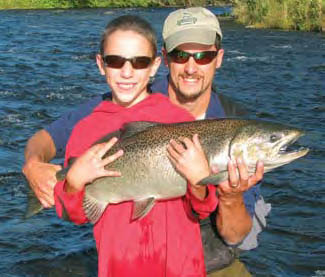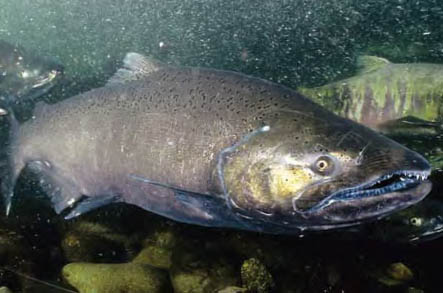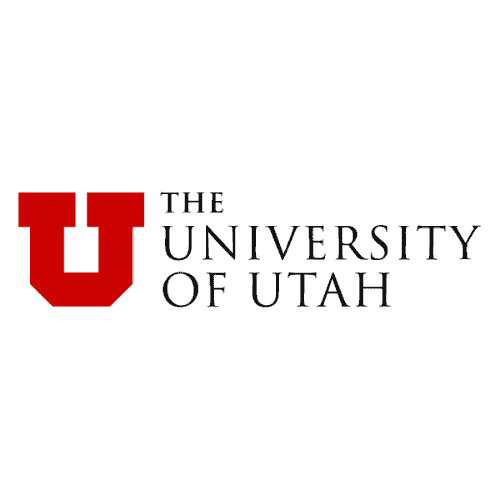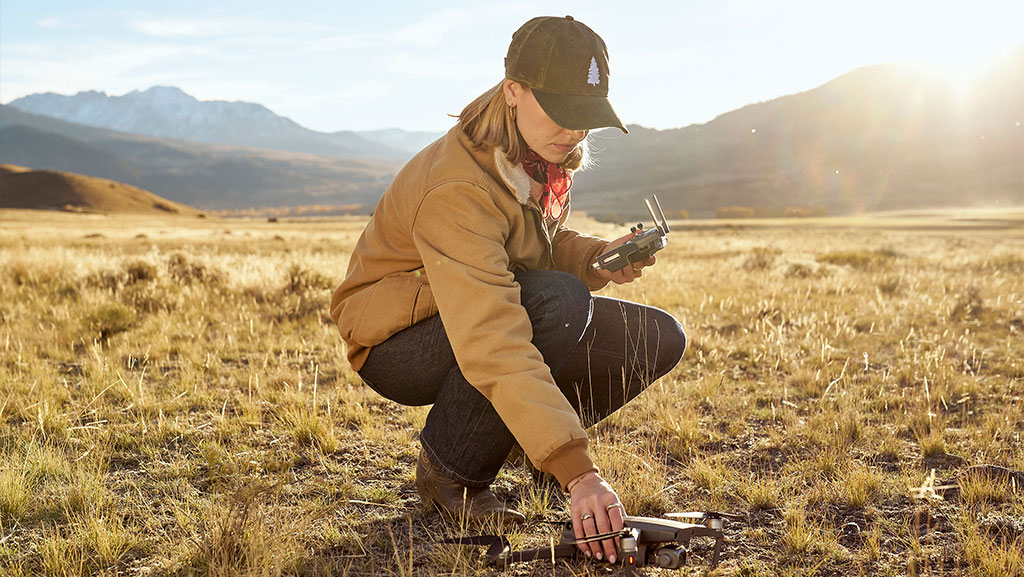Doug Barclay vividly remembers a fall day in the early 1980s when he said upwards of 3,000 people were on his New York property along the lower Salmon River, parking on both sides of the road—all the way back to the village of Pulaski, more than a mile away. “What am I going to do from a liability standpoint? How am I going to handle this?” he said in an interview of the salmon-crazed hordes of fishermen that were trashing and trespassing on his property day after day during the annual fall spawning run of chinook and coho salmon. He recalled the excessive drinking, the garbage on the sides of the river and all over his land, and the louts who defecated along the road near his house.
Barclay, then a New York state senator nearing the end of two decades in office, said he approached one man who was walking toward the river with his son and reminded him that he was on private property. The response?
“They went in and sort of just said, ‘The hell with you,’” he recalled, adding the two were quickly followed by more than two dozen other anglers with the same attitude.
It’s been more than two decades since Barclay opened the Douglaston Salmon Run, a pay-to-fish business along what unquestionably is the best place to fish on the river for spawning salmon and trout from Lake Ontario because of its closeness to the lake. Anglers are charged $30 a day to fish, parking in a lot off Lake Road. The lot has a 300-vehicle capacity.
Barclay, 76, keeps trespassers off his property with posted signs and a team of 15–20 employees. Each year, he said, he’s expanded his offerings to clients, making the property more and more amenable to anglers. He has put in a fish cleaning station and paths, and offered exclusive lodging for anglers and hunters in five separate lodges on his 5,000 acres of land that has been in his family for seven generations.
Recently he has expanded his private fishing area slightly through lease agreements with two adjacent landowners who, like Barclay, want to control the angling crowds on their land. He’s looking into expanding his services for those willing to pay for them. He sees his business as an example, a magnet to help bolster the North Country economy.
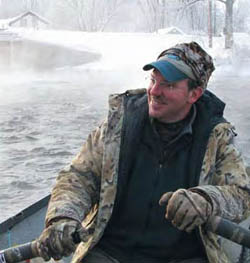
Barclay talked this week about the Douglaston Run’s present and future, and his opinions on managing the Salmon River in general.
You’re now charging $30 a day. What was the original cost?
About $3 to $4. Each year I’ve tried to upgrade a little. We put in a fish cleaning station (early on) . . . instead of fishermen taking their fish back to their motel and cleaning them in their bathtub. This was done. Now (thanks to a DEC ban) you can’t clean fish on the river. I’ve put signs in, paths, added people. We open at 5 a.m. and close at 7 p.m. We’ve done a relatively good job.
Do you make a profit? Are you making a bundle off it?
I’m not making a bundle off it. We break even . . . a little better than breaking even. You can never tell. Some years we haven’t. And those who come probably want to have dinner and stay in a motel and do whatever they have to do. That attracts dollars (to the community), as opposed to the meat fishermen before who drank a case of beer that they probably didn’t buy in Pulaski.
What we have here is as good as Alaska. By the time you go to Alaska, it would cost you an arm and a leg. Here, you can do it for $30.
I’ve entertained a lot of people. They haven’t seen anything like it before. Just being on the river. Even if you don’t catch a fish, it’s absolutely beautiful. I’d like to pursue it from a conservation, ecological standpoint and make it a magnet for economic development.
How many people a year come through here? Any celebrities?
We’ve had former President George Bush up here twice. He thought it was absolutely great. I went to North Korea in December. I work on relationships between North and South Korea. Goh Kun, one of the former (South Korean) prime ministers, he was acting president, came up. He had never fished for salmon, so I outfitted him. I told Jason (Edwards, the river keeper of the Douglaston Run), “You’d better make sure he catches a steelhead.” Well, thank God he did and you should have seen him smile, it was great.
I’ve entertained a lot of people. They haven’t seen anything like it before. Just being on the river, even if you don’t catch a fish, it’s absolutely beautiful. I’d like to pursue it from a conservation, ecological standpoint and make it a magnet for economic development.
I think those who own the land should profit. The state owns much of the land along the river. It charges for going into state parks, golf courses. They charge for trout fishing on Long Island. It’s not unprecedented at all.
How could the Douglaston Run be an economic magnet for the area?
I’ve been in economic development all my life. I’ve done it locally, I’ve done it statewide, I’ve done it nationally, I’ve done it internationally. The idea is to get a place where people want to be. That’s reasonable. Where they can feel safe, clean. It’s coming. You have some new restaurants here. Two brand new antique shops. There needs to be more things for women, the wives that come, who don’t want to fish. We need to get it all together to let people know what we have here. Historically, our country never looked north. It’s always looking south. I’m looking north. There’s so much there. This (river) is a jewel. From an economic standpoint, this thing is really valuable.
I know you have enough going managing your place, what’s your opinion about what should be happening upstream?
I’m not advocating anything, but I think the whole river ought to be managed better. The problem is, fishing has become so important to so many people. But there isn’t enough resource for those people to fish in and some way you have to limit the numbers on the resource . . . at least on the congested areas of river. Hydrologically, you could do things so that you could have more spots. It’s tricky and expensive, but it could be done. You could get more people on the river by putting them in the right places.
How would that be done?
Have fishermen buy a ticket, or however you’re going to manage the thing. Buy a ticket for a spot wherever it is, for hole such and such, and when that hole is filled . . . you just sell so many tickets.
Who would profit?
I think those who own the land should profit. The state owns much of the land along the river. It charges for going into state parks, golf courses. They charge for trout fishing on Long Island. It’s not unprecedented at al
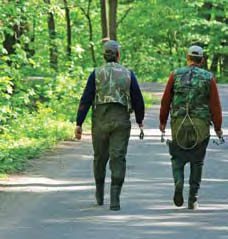
I think it ought to be a sports fishing river. Preferably, but not exclusively, fly fishing could be a good part of it. We’re not strictly fly, but I’d say 60-65 percent are strictly fly fishermen. It’s just evolved. We encourage catch and release. You have five small lodges where you put up customers.
I know you’re tr ying something out new where you have tents on the side of the stream for gourmet dinners for anglers willing to pay the price. Talk about that.
I’ve been to Africa on safari. I’ve seen what you can do with tents. How people think they’re roughing it, but they’re not roughing it. Then they get up and have a good night’s sleep in the lodge or house. I think there’s something with the fire burning, a couple of drinks, great food, wine. I think people like that. It brings people together. Corporations entertain all the time.
[The idea is] you get off a plane in Syracuse, arrive here in 35–40 minutes, take your clothes off in the changing tent, then walk [out] and fish. Come back to shore and have [a several-course, gourmet] dinner under a tent. Stay at one of the cottages. Go back in the morning to fish. Leave at noon.
It’s not unique. Somebody out west in Wyoming is doing it, all in tents. Some people have done it in yurts (domed, tent-like structures).
Do you have a long- term plan for the development of the Douglaston Run?
I have, but it’s not well articulated. I hired a planner a couple of years ago to plan the whole thing . . . if you want to move in that direction. Sort of a mini-resort, horseback riding, trap shooting.
Seeing that you own this great stretch of river, do you ever fish it?
Once in a while. Sure, fly fish. I’ve taken the Orvis course twice.
This article originally appeared in The Post-Standard on October 12, 2008. Reprinted with permission.
David Figura is the outdoors editor for The Post- Standard, Syracuse, New York. He can be reached at dfigura@syracuse.com.
